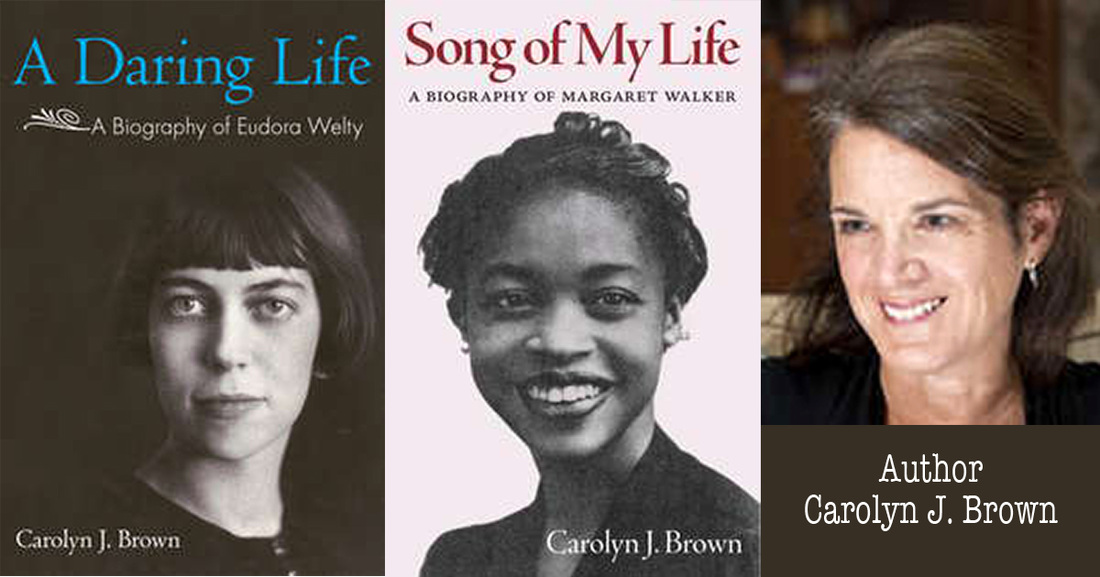Writing About Writers by Carole McKellar - This month - Carolyn J. Brown explores the lives of Eudora Welty and Margaret Walker Alexander in two new books, "A Daring Life" and "Song of My Life." "Bay Reads" looks at both books and lands an exclusive interview with Carolyn J. Brown!
One of the points that struck me in her talk was that Eudora Welty, an iconic figure in American literature, is typically shown in photographs as an old woman. The book covers of both biographies feature photographs of the writers as young women. Dr. Brown’s stated intention was to write books for young readers, but her books speak to readers of all ages. She used photographs liberally and frequently quoted both writers. Although both biographies are entertaining reads, they are scholarly books with appendices, bibliographies, and source notes. Dr. Brown is an adjunct instructor at Millsaps College. She earned a BA from Duke University in English and History and a Master’s and Ph.D. in English from University of North Carolina-Greensboro. Both Margaret Walker and Eudora Welty were fortunate to have educated parents who provided an environment filled with books and reverence for learning. They were born in the early years of the twentieth century. They were educated in prestigious universities in the Midwest, but both spent most of their working lives in Jackson, Mississippi. Ms. Welty never married and lived in her family home until her death in 2001. Ms. Walker married and raised four children as the primary breadwinner. She died in 1998. A Daring Life: A Biography of Eudora Welty, was published by University Press of Mississippi in 2012. The title comes from Ms. Welty’s autobiographical One Writer’s Beginnings when she wrote, “As you have seen, I am a writer who came of a sheltered life. A sheltered life can be a daring life as well. For all serious daring starts from within.” Much has been written about Ms. Welty, but A Daring Life emphasized her childhood and young adult life. The book included charming photographs of her youthful artwork. Aside from her novels, stories, and essays, Ms. Welty was an accomplished photographer. She loved to travel and led a more adventurous life than would be expected of a lady of her class and time. Song of My Life: A Biography of Margaret Walker was published in October, 2014 in time for the centennial of her birth. This is the first biography of Ms. Walker who was described as “the most famous person nobody knows.” Ms. Walker is best known for writing Jubilee, published in 1966, a novel which tells the story of her great-grandmother. She was a poet, essayist, and educator. For most of her career, she taught at Jackson State University, the site of the Margaret Walker Alexander National Research Center, which contains her papers. Ms. Walker was the contemporary and friend of Richard Wright, Alice Walker, Nikki Giovanni, and other influential African American writers of the twentieth century. Excerpts of Ms. Walker’s poetry in Song of My Life led me to search out entire poems on the Poetry Foundation website. There is power and beauty in her poems. “For My People," arguably her most famous poem, was part of a collection that won her the Yale Series of Younger Poets Award in 1942. The following demonstrates the strength of her voice: For my people standing staring trying to fashion a better way from confusion, from hypocrisy and misunderstanding, trying to fashion a world that will hold all the people, all the faces, all the adams and eves and their countless generations; Let a new earth rise. Let another world be born. Let a bloody peace be written in the sky. Let a second generation full of courage issue forth; let a people loving freedom come to growth. The poem “I Want to Write” articulates Ms. Walkers ambition as an artist. I want to write I want to write the songs of my people I want to hear them singing melodies in the dark. I want to catch the last floating strains from their sob-torn throats. I want to frame their dreams into words; their souls into notes. I want to catch their sunshine laughter in a bowl; fling dark hands to a darker sky and fill them full of stars then crush and mix such lights till they become a mirrored pool of brilliance in the dawn. With these two books, Carolyn J. Brown reintroduced us to the gifted life of Margaret Walker Alexander and has given us a fresh and vivid portrayal of Eudora Welty. Their stories stayed with me for weeks as I contemplated their lives and accomplishments. I look forward to reading Dr. Brown’s next book about the life of Kate Freeman Clark (1875-1957), an impressionist painter from Holly Springs, Mississippi. She is currently doing research on Clark, who is largely unknown in her home state. That should be another fascinating read. Carol J. Brown Interview In order to learn more about Dr. Brown’s habits as a writer and a reader, I asked her the following questions which she kindly answered:
What kind of books did you enjoy reading as a child? I loved biographies! There was a series (I don’t recall the name), and I enjoyed the ones about strong women like Clara Barton, Jane Addams and Florence Nightingale. I loved the Little House on the Prairie series. I loved fairy tales. What do you enjoy reading in your spare time now? I love new fiction, but after a while I will pick up a classic I missed or reread one that I have not read in a while. I read one Jane Austen novel a year. It’s funny—I don’t tend to read biography. I prefer fiction. (Ms. Brown is the president of the Mississippi chapter of the Jane Austen Society of North America.) What books are on your nightstand? The Signature of Everything by Elizabeth Gilbert; The Department of Speculation by Jenny Offill; Sanditon and Other Stories by Jane Austen; Nothing Gold Can Stay by Ron Rash When did you decide to become a writer? I don’t think I ever decided or there was a moment when I said, “I am going to be a writer when I grow up.” I had great English teachers in high school, and my creative writing teacher submitted a story I wrote (entitled “The Rose Garden”) to a local contest and it won! In college I wrote a couple of papers I was quite proud of, followed by my Master’s thesis and dissertation. My dissertation won “Dissertation of the Year” from UNC-Greensboro, a $1000 prize. I never published my dissertation, but it was over 500 pages so I knew I could write a book—I had the discipline. But marriage and children interrupted my writing career, and I didn’t get back to it until I moved to Jackson and rediscovered Eudora Welty who I first read in graduate school. What lead you to write biographies? I thought there needed to be a book about Eudora Welty for the younger set. I first tried to write her life as a story for young children, but I couldn’t find the right voice. Then I found a biography of Edith Wharton written by a librarian (The Brave Escape of Edith Wharton by Connie Nordhielm Wooldridge) that I loved. It was about 150 pages and a beautiful combination of illustration and text. And it was an enjoyable read for all ages. I had found my model and, as it turns out, my genre. I would love to write fiction, but all my life I have written in the academic realm. Not since I wrote “The Rose Garden” in the eleventh grade have I written any fiction! Why did you choose to write for younger readers? I have two sons and felt that they did not have a book that introduced them to Eudora Welty. I wanted them to know who Welty was, visit her house, read her fiction…there was no book that met the needs of the upper middle and high school age student. And, according to my editor, the Mississippi Library Association had approached her with a request for more non-fiction books for young readers. So the timing was right, and a biography series was born. How long did it take you to write each book? What percentage of the time was spent on research and what on actually writing? At least, at a minimum for me, two years. I need a year to a year and a half for research and writing. I love research—going to libraries, reading primary documents, collecting photographs, just getting carried away with the subject. Then I write, and I write pretty quickly. Once I turn the manuscript in it goes through all the steps that University Press of Mississippi requires—editing, layout, gathering permissions, until it is finally ready to be printed. So, to answer you question, I would say it is a 60/40 split: 60% research, 40% writing. What advice would you give would be writers? If you have something you want to write about, stick with it. It can be hard to get published, but it’s important to find the right publisher and editor. And writing is rewriting. I have a writing partner in Jackson who read many drafts and told me when I got off track and away from the subject. You need a person you trust to read your drafts. Find a writing partner or group. Comments are closed.
|
Categories
All
Archives
July 2024
|
Shoofly Magazine Partners
Our Shoofly Partners are local businesses and organizations who share our mission to enrich community life in Bay St. Louis, Waveland, Diamondhead and Pass Christian. These are limited in number to maximize visibility. Email us now to become a Shoofly Partner!




























 RSS Feed
RSS Feed























